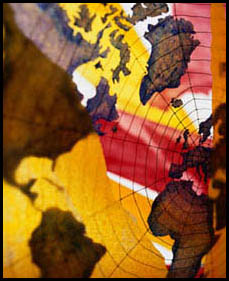|
|
Macau
Online Business Education. Economy. Politics. Culture. Religion. Media

Macau
Capital: Macau City
Internet LinksOfficial Sites of Macau
Macau
Statistics
Macau Statistics and
Census Service
Weather
Direcção dos Serviços
Meteorológicos e Geofísicos
Map
Political Map of Macau
Introduction
Macau
Background: Colonized by the Portuguese in the 16th century, Macau was
the first European settlement in the Far East. Pursuant to an agreement
signed by China and Portugal on 13 April 1987, Macau became the Macau
Special Administrative Region (SAR) of China on 20 December 1999. China
has promised that, under its "one country, two systems" formula, China's
socialist economic system will not be practiced in Macau and that Macau
will enjoy a high degree of autonomy in all matters except foreign and
defense affairs.
Geography Macau
Location: Eastern Asia, bordering the South China Sea and China
Geographic coordinates: 22 10 N, 113 33 E
Map references: Southeast Asia
Area: total: 25.4 sq km water: 0 sq km land: 25.4 sq km
Area - comparative: about 0.1 times the size of Washington, DC
Land boundaries: total: 0.34 km border countries: China 0.34 km
Coastline: 41 km
Maritime claims: not specified
Climate: subtropical; marine with cool winters, warm summers
Terrain: generally flat
Elevation extremes: lowest point: South China Sea 0 m highest point:
Coloane Alto 172.4 m
Natural resources: NEGL
Land use: arable land: 0% permanent crops: 0% other: 100% note: "green
areas" represent 22.4% (1998 est.)
Irrigated land: NA sq km
Natural hazards: typhoons
Environment - current issues: NA
Geography - note: essentially urban; one causeway and two bridges
connect the two islands of Coloane and Taipa to the peninsula on mainland
People Macau
Population: 461,833 (July 2002 est.)
Age structure: 0-14 years: 21.8% (male 52,262; female 48,439) 15-64
years: 70.9% (male 154,942; female 172,647) 65 years and over: 7.3%
(male 13,616; female 19,927) (2002 est.)
Population growth rate: 1.75% (2002 est.)
Birth rate: 12.19 births/1,000 population (2002 est.)
Death rate: 3.78 deaths/1,000 population (2002 est.)
Net migration rate: 9.08 migrant(s)/1,000 population (2002 est.)
Sex ratio: at birth: 1.05 male(s)/female under 15 years: 1.08
male(s)/female 15-64 years: 0.9 male(s)/female 65 years and over: 0.68
male(s)/female total population: 0.92 male(s)/female (2002 est.)
Infant mortality rate: 4.44 deaths/1,000 live births (2002 est.)
Life expectancy at birth: 84.73 years (2002 est.) male: Total fertility
rate: 1.31 children born/woman (2002 est.)
HIV/AIDS - adult prevalence rate: NA%
HIV/AIDS - people living with HIV/AIDS: NA
HIV/AIDS - deaths: NA
Nationality: noun: Chinese adjective: Chinese
Ethnic groups: Chinese 95%, Macanese (mixed Portuguese and Asian
ancestry), Portuguese, other
Religions: Buddhist 50%, Roman Catholic 15%, none and other 35%
(1997 est.)
Languages: Portuguese, Chinese (Cantonese)
Literacy: definition: age 15 and over can read and write total
population: 90% male: 93% female: 86% (1981 est.)
Government Macau
Country name: conventional long form: Macau Special Administrative
Region conventional short form: Macau local short form: Aomen (Chinese);
Macau (Portuguese) local long form: Aomen Tebie Xingzhengqu (Chinese);
Regiao Administrativa Especial de Macau (Portuguese)
Dependency status: special administrative region of China
Government type: NA
Administrative divisions: none (special administrative region of China)
Independence: none (special administrative region of China)
National holiday: National Day (Anniversary of the Founding of the
People's Republic of China), 1 October (1949); note - 20 December 1999
is celebrated as Macau Special Administrative Region Establishment Day
Constitution: Basic Law, approved in March 1993 by China's National
People's Congress, is Macau's "mini-constitution"
Legal system: based on Portuguese civil law system
Suffrage: direct election 18 years of age, universal for permanent
residents living in Macau for the past seven years; indirect election
limited to organizations registered as "corporate voters" (257 are
currently registered) and a 300-member Election Committee drawn from broad
regional groupings, municipal organizations, and central government bodies
Executive branch: chief of state: President of China JIANG Zemin
(since 27 March 1993) elections: chief executive chosen by a 200-member
selection committee for up to two five-year terms cabinet: Executive
Council consists of all five government secretaries, three legislators,
and two businessmen head of government: Chief Executive Edmund HO Hau-wah
(since 20 December 1999)
Legislative branch: unicameral Legislative Council or LEGCO (27 seats;
10 elected by popular vote, 10 by indirect vote, and 7 appointed by
the chief executive; members serve four-year terms) election results:
percent of vote - NA%; seats by political bloc - Entertainment Industry
3, pro-democracy 2, pro-Beijing Labor Union 2, pro-Beijing Neighborhood
Association 2, pro-business 1 elections: last held 23 September 2001
(next to be held NA 2005)
Judicial branch: The Court of Final Appeal in the Macau Special
Administrative Region
Political parties and leaders: there are no formal political parties,
however, there are civic associations that, for purposes of legislative
voting, join together to form political blocs
Political pressure groups and leaders: Catholic Church [Domingos LAM,
bishop]; Macau Society of Tourism and Entertainment or STDM [Stanley
HO, managing director]; Union for Democracy Development [Antonio NG
Kuok-cheong, leader]
International organization participation: CCC, ESCAP (associate),
IHO, IMO (associate), Interpol (subbureau), ISO (correspondent), UNESCO
(associate), WMO, WToO (associate), WTrO
Diplomatic representation in the US: none (special administrative region
of China)
Diplomatic representation from the US: the US has no offices in Macau,
and US interests are monitored by the US Consulate General in Hong Kong
Flag description: light green with a lotus flower above a stylized
bridge and water in white, beneath an arc of five gold, five-pointed
stars: one large in center of arc and four smaller
Economy Macau
Economy - overview: Macau's economy two years after reversion to China
remains one of the most open in the world, according to the World
Trade Organization. The government collects no duty on imports and
sets no restrictions on exports beyond those required by international
agreements. The territory's net exports of goods and services account
for 35% of GDP, with tourism and apparel exports as the mainstays. The
territory therefore has been hit hard by the 2001 downturn in its key US
and EU export markets. Tourism remained strong, however, driven by a surge
in visitors from mainland China. In response to the expected contraction
of the economy in 2002, the government has announced a stimulative
income tax cut and public works program that will push the budget into
deficit. China already has extended support by easing restrictions on
travel to Macau and is proposing a China-Hong Kong-Macau free trade
area. China's economic weight is increasingly felt, with the mainland
now holding more than 50% of assets in the financial, real estate,
and construction sectors. Mainlanders, however, have been excluded
from bidding on the gambling industry licenses that Macau is offering
to break up the territory's four-decade-old gambling monopoly. Gambling
taxes account for up to 60% of revenue, and the government with Beijing's
backing intends to revitalize the industry.
GDP: purchasing power parity - $8 billion (2001 est.)
GDP - real growth rate: 0.5% (2001 est.)
GDP - per capita: purchasing power parity - $17,600 (2001 est.)
GDP - composition by sector: agriculture: 1% industry: 25% services: 74%
(2000 est.)
Population below poverty line: NA%
Household income or consumption by percentage share: lowest 10%: NA%
highest 10%: NA%
Inflation rate (consumer prices): -2% (2001 est.)
Labor force: 218,000 (2001)
Labor force - by occupation: restaurants and hotels 26%, manufacturing
20%, other services and agriculture 54% (2000 est.)
Unemployment rate: 6.5% (2001 est.)
Budget: revenues: $1.15 billion expenditures: $1.03 billion, including
capital expenditures of $166 million (2000 est.)
Industries: tourism, gambling, clothing, textiles, electronics,
footwear, toys
Industrial production growth rate: NA%
Electricity - production: 1.4 billion kWh (2000)
Electricity - production by source: fossil fuel: 100% hydro: 0% other: 0%
(2000) nuclear: 0%
Electricity - consumption: 1.476 billion kWh (2000)
Electricity - exports: 1 million kWh (2000)
Electricity - imports: 175 million kWh (2000)
Agriculture - products: rice, vegetables
Exports: $2.5 billion (f.o.b., 2000)
Exports - commodities: clothing, textiles, cement, electronics, cameras
Exports - partners: US 48%, EU 28%, China 10%, Hong Kong 7% (2000)
Imports: $2.3 billion (c.i.f., 2000)
Imports - commodities: clothing, textiles, yarn, minerals, electrical
machinery, fuel, livestock
Imports - partners: China 41%, Hong Kong 15%, EU 10%, Taiwan 10%,
Japan 6% (2000)
Debt - external: $1.5 billion (1998)
Economic aid - recipient: $NA
Currency: pataca (MOP)
Currency code: MOP
Exchange rates: patacas per US dollar - 8.033 (January 2002), 8.034
(2001), 8.026 (2000), 7.992 (1999), 7.979 (1998), 7.975 (1997); note -
linked to the Hong Kong dollar at the rate of 1.03 patacas per Hong
Kong dollar
Fiscal year: calendar year
Communications Macau
Telephones - main lines in use: 176,902 (November 2001)
Telephones - mobile cellular: 158,251 (November 2001)
Telephone system: general assessment: fairly modern communication
facilities maintained
NA international: communications carriers provided via Hong Kong and
China; satellite
earth station - 1 Intelsat (Indian Ocean)
Radio broadcast stations: AM 0, FM 2, shortwave 0 (1998)
Radios: 160,000 (1997)
Television broadcast stations: 0 (receives Hong Kong broadcasts) (1997)
Televisions: 49,000 (1997)
Internet country code: .mo
Internet Service Providers (ISPs): 1 (2000)
Internet users: 60,000 (2001)
Transportation Macau
Railways: 0 km
Highways: total: 50 km paved: 50 km unpaved: 0 km (2001)
Waterways: none
Ports and harbors: Macau
Merchant marine: none (2002 est.)
Airports: 1 (2001)
Airports - with paved runways: total: 1 over 3,047 m: 1 (2001)
Military Macau
Military branches: no regular indigenous military forces; responsibility
for defense reverted to China on 20 December 1999; there is a local
police force
Military manpower - availability: males age 15-49: 128,005 (2002 est.)
Military manpower - fit for military service: males age 15-49: 70,508
(2002 est.)
Military - note: responsibility for defense reverted to China on 20
December 1999
Transnational Issues Macau
Disputes - international: none
This page was last updated on 1 January 2002
News
Government Information
Bureau
Jornal Tribuna de Macau
Macao Daily News
Macao Hoje
Arts & Culture
Macau Cultural Institute
Macau Museum
Business & Economy
Macau Economic
Services
Monetary and
Foreign Exchange Authority of Macau
Transportation
Airline
Air Macau
Macau International Airport
Country Guides
Macau
Tourist Homepage
Macau
Tourist Guide
Macau City
Guide
Education
Macau Polytechnic
Institute
University of Macau
History
Macau 99
Macau History
Search
Macau
Yellow Pages
Sports
Macau Kendo
Association
|
|
Online
Education Resources
Natural Stone Veneer
Stone Directory

Las Vegas Graphic &
Web Design
Professional
Graphic Design & Web Design in Las Vegas

Dentures.
Complete Dentures
&
Partial Dentures

Management
Training Courses in Las Vegas USA
Leadership Training & Management Courses in Las Vegas
Management
Best Practices
Management Best Practices
Management
Consulting Courses
Management Consulting Courses
Management
Training Courses
Management Training Courses
Business School
Online
Online Business Schools
Open Courseware
Free Open Courses
Online Business Courses
Business Schools Online
Business
Management Courses
Business Management Courses
CEO Magazine
CEO Magazine
CEO Library
CEO Library
CEO Club
Executive Networking
CEO Books
CEO Books
MBA Review
Review of MBA Programs
Best MBA
Ranking of World's Best MBA Programs
MBA distance
Learning
Online MBA
Top Ranking MBA
Ranking of Top MBA Programs
Online Executive
MBA
Online Executive MBA Programs
Accelerated MBA
Accelerated MBA Programs
Las Vegas Web Design
Las Vegas Web Design
|
